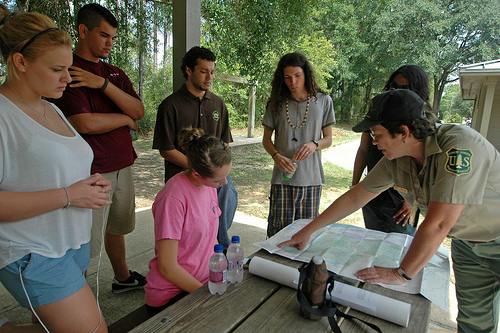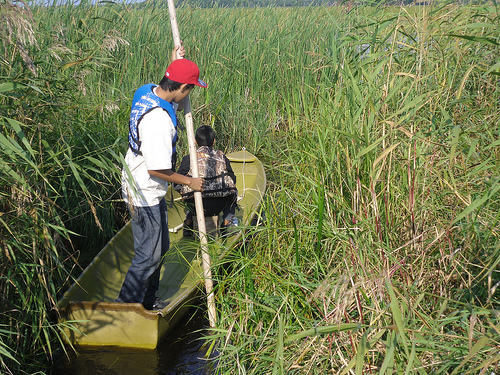
The National Forests in Florida hosted Native American teenagers from the Florida Indian Youth Program on the Apalachicola National Forest. The program, sponsored by the Florida Governor’s Council on Indian Affairs focuses on job skills, academic skills, life-skills, social and cultural activities.
Their eyes wide open and their minds prepped to learn, a group of Native American youths from Florida recently glimpsed the skills and knowledge needed for Forest Service careers during a field trip to the Apalachicola National Forest.
Forest professionals from civil engineering, landscape architecture, archaeology and recreation escorted teenagers from the Florida Indian Youth Program during their visit. The teens got the stories behind several hiking, biking and fishing day-use areas on the forest. The goal was to give the teens insight in the process of creating user-friendly recreation sites. From idea, to planning, to execution, the employees presented the stages involved in site development. Read more »
It’s shaping up to be a good year for students in Indian Country.
For the first time in school history, students at Saginaw Chippewa Tribal College in Mount Pleasant, Michigan can register to take physics thanks to an upgraded laboratory. And at Leech Lake Tribal College in Cass Lake, Minnesota, students were able to take trigonometry for the first time last year. Funded and supported by USDA’s National Institute of Food and Agriculture (NIFA ), both schools made improvements to bolster their students’ learning in the areas of science and mathematics.
NIFA’s Tribal Colleges Education Equity Grant is a noncompetitive program that enhances educational opportunities for American Indians in the food and agricultural sciences. These grants strengthen formal educational opportunities at the associate, baccalaureate, or graduate level at 1994 land-grant institutions, also known as tribal colleges. Read more »
In keeping with President Obama and Secretary Vilsack’s efforts to improve the lives of Native Americans, USDA officials last month signed two Memorandums of Understanding with the Bureau of Indian Affairs (BIA). The intention is to improve access to USDA programs by tribes and tribal members.
The MOUs set up a framework for consultation, training, coordination, and the provision of technical assistance which will increase the amount of Indian land enrolled under USDA conservation programs through NRCS and farm loan programs through FSA and improve service delivery on those lands. Farming and animal management, grazing, ranching and related food and agricultural operations will be supported through improved interdepartmental coordination. The MOUs also support establishment of Native rural businesses, renewable energy development, and job creation. Read more »
Last month, representatives of several federal agencies held a meeting with the federally recognized tribes in Southeast Alaska. The meeting, in Alaska’s capital city of Juneau, was the fifth in a series of government-to-government Tribal Collaboration Meetings scheduled with tribes in Alaska. The venue for the meeting between federal officials and tribal leaders was the Central Council of Tlingit and Haida Indian Tribes of Alaska Vocational Training and Resource Center.
Tribal representatives and other partners from the region used the session to discuss issues affecting their villages. Leaders from USDA Rural Development, the Natural Resources Conservation Service, Farm Service Agency, the U.S. Forest Service, Small Business Administration, Housing and Urban Development, the Economic Development Administration (EDA), and Intertribal Agriculture Council were on hand to listen and participate in the dialogue. Read more »
Last week it was my privilege to attend the annual United Tribes Tribal Leaders Summit and associated conferences in Bismarck, North Dakota. This annual gathering is an opportunity for tribal leaders from around the region to exchange information about current issues in Indian Country.
While there, I discussed the importance of the recently-appointed Council for Native American Farming and Ranching. The Council was selected by Agriculture Secretary Tom Vilsack to suggest changes to USDA regulations and to provide internal guidance or propose measures that would promote the participation of American Indian farmers and ranchers in USDA programs and support government-to-government relations between USDA and tribal governments. The Council is a discretionary advisory committee established in furtherance of Keepseagle v. Vilsack, which was a lawsuit alleging past discrimination by USDA against Native American farmers and ranchers in the way it operated its farm loan program.
I also met with Standing Rock Sioux Tribal Chairman Charles Murphy and shared that USDA will fund a water quality project to rehabilitate and expand a failing sewage treatment system serving members of the Standing Rock Sioux Tribe. Read more »

American Indian youth ricing. The Leech Lake Band of Ojibwe rely on water to preserve their culture, their agriculture and their overall quality of life
When Leech Lake Band of Ojibwe water resource professionals discovered that 60 percent of the Minnesota reservation’s septic systems were sub-standard or failing, they feared for the reservation’s health, indigenous rice fields, and fish populations.
Shirley Nordrum, a Leech Lake Extension educator with the University of Minnesota, responded with an extensive education program. She explains to homeowners how having the sanitation department pump their septic systems could protect their health and contribute to the safety of the environment and their community. She uses funds from U.S. Department of Agriculture’s (USDA) Federal Recognized Tribes Extension Program (FRTEP) to conduct this outreach effort. Her program has become a model for other communities. Read more »


